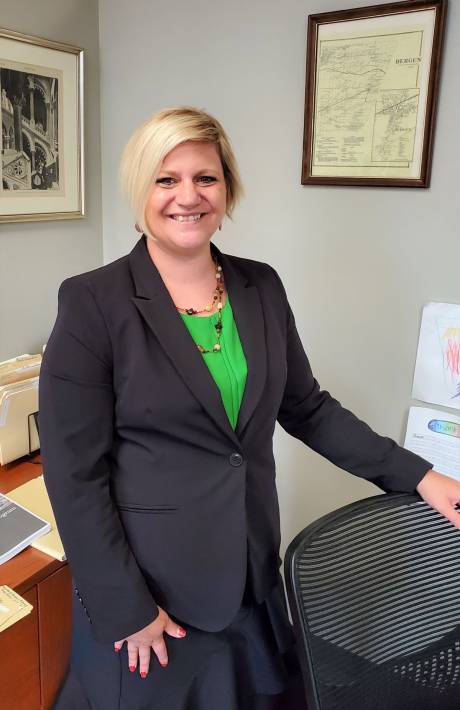On June 22, Bergen native Rachael Tabelski assumed the role of Batavia’s Acting City Manager, replacing Martin Moore, who departed after about 20 months on the job.
The Batavian sat down with Tabelski at her office at City Hall earlier this week to learn more about her life experiences and her thoughts on being thrust into the municipality’s leadership position.
Today’s first part of a two-part feature focuses on her upbringing, education and influences.
Monday's second part provides insight into her tenure with the Genesee County Economic Development Center and Batavia Development Corporation, and an update on City management projects and priorities.
--------------
“I believe that every position that I have taken in the community – starting with working with Assemblyman Steve Hawley and then moving to the (Genesee County) Economic Development Center to the Batavia Development Corporation to Assistant City Manager and now Acting City Manager – has been, for me personally, a step to better serve the residents of the City of Batavia.”
Buoyed by the preceding statement, Rachael Tabelski says she is ready, willing and able to manage the City of Batavia staff and work in tandem with City Council to make the community and Genesee County “better than we were yesterday.”
Time will tell whether the lifelong Genesee County resident becomes Batavia’s next permanent city manager but, at this juncture, Tabelski said she is more concerned with applying what she has learned to help move the City forward.
Tabelski’s journey to her current station began as an inquisitive daughter of Joan Fodge, who is one of 11 children of a family that put down its roots in the eastern part of Genesee County just as the U.S. Civil War was drawing to a close.
“My grandfather, Adrian Fodge, was an engineer working for GRS (General Railway Signal) in Rochester, which is now Alstom (Signaling), where my mother works,” said Tabelski, a 2000 graduate of Byron-Bergen Central School. “He also had a hobby farm in the Town of Bergen.”
She said that her great-great-grandfather came over from Ireland in 1865.
“The same time Lincoln’s body was traveling the country on the railway, I’m imagining this gentleman coming over through New York City and into the Stafford-Le Roy-Bergen area,” she offered.
ALWAYS OPEN TO LEARNING
Tabelski said her family’s varied interests and careers made for enlightening discussions at family reunions.
“We have scientists and engineers in our very big family, which I’m very proud of, and they were always interested in learning more, so I guess that’s where I get it from,” she said. “I never assume I know everything about anything. I really walk into every situation wanting to learn more -- to understand it -- and I think that’s what makes me a good fit for the City of Batavia in terms of my attitude.”
After graduating from high school, Tabelski enrolled at Virginia Commonwealth University in Richmond, Va., a move precipitated by her interest in books by acclaimed murder mystery novelist Patricia Cornwell.
“It was because I read books authored by Patricia Cornwell, based off the medical examiner in Richmond, Virginia,” she said. “I researched it and found out that this college has a Forensic Science program. But I wasn’t great at science, and I learned that when I went there and spent a few semesters there.”
Tabelski then discovered the Public Safety/Crime Scene Investigation technical degree program at the State University of New York at Canton.
"That was big then. The show ("CSI") had just come out. It was great,” she recalled.
She said students would take cars, make skid marks and measure them, and also would dress up in suits on certain days to investigate mock crime scenes on the campus.
“I never thought I would understand science until I applied that. We did fingerprinting and got tested on it,” she said. “It really was fun."
EXPLORING POLICE WORK
After earning her bachelor’s degree in 2005, Tabelski did a six-month internship with the Monroe County Sheriff’s Office under the guidance of Ron Harling.
“He was a great mentor and I encountered a wide range of experiences,” she said.
One of those was accompanying a police officer while on patrol.
“The first question they asked was do you know how to use this – a shotgun? Do you have my back?” she said. “I was like, ‘I don’t know how to use a shotgun. Do I have your back? I’m the intern.'"
She said she took a couple of civil service tests in Monroe County that didn’t pan out, and decided that becoming a police officer wasn’t in the cards.
“Harling had mentioned a program called Public Administration at SUNY Brockport, so I enrolled in that,” she said. “And it was an amazing program with amazing professors who taught a really different way to think about government.”
She went on to explain the thought process.
“Most people think about government as a need to keep their job. So, it’s difficult – with little or big problems – to solve them because if you solve the problem, what happens to your job? We were taught to think differently. Your job is to solve problems and if it means that works you out of a job, so be it. You’ll find something greater, something bigger.”
HIGH PRAISE FOR HAWLEY, HYDE
Tabelski earned a master’s degree in Public Administration in 2008, while also entering the political arena as a legislative aide to Assemblyman Stephen Hawley and as a council member on the Bergen Town Board.
She left those posts in September 2010 when she was hired by the Genesee County Economic Development Center as the director of marketing and communications. She credited Hawley and GCEDC President Steve Hyde for expanding her knowledge of finances.
“I feel that I am strong in the financial field because of my work at the economic development center -- everything I did in terms of data and analysis and financial analysis, I certainly can attribute to the work there,” she said. “Steve Hyde was a great mentor and Steve Hawley was as well as far as understanding the legislative process in Albany.”
She said that working for Hyde and the GCEDC was like embarking upon more post-graduate studies.
“I got an MPA from Brockport and from Steve Hyde I got an MBA. I went to the Steve Hyde school of business,” she said. “He’s the most creative financial mind I’ve ever met, and he helped me understand how to be creative with finances in a positive way, not in a sneaky way. He showed me how to look at things differently and how to be very creative with finances.”
She said Hawley instilled in her the value of listening to others en route to finding solutions.
“I think Steve Hawley taught me that working with persons of any affiliation toward a common goal is the most important thing you can do,” she said. “Working with all sides of the aisle to achieve a common goal is more important than any type of affiliation. That’s the biggest lesson I learned from him.”
Tabelski said the community is fortunate to have the support of Hawley and agencies such as the GCEDC along with the “talented people” who are working for the City of Batavia.
BELIEF IN THE CITY OF BATAVIA
“We have an amazing, competent staff that works very, very hard,” she said. “When you have staff in the City that believes in the City, that changes everything. And the same goes when your residents believe in their City.”
She said traces her “belief” in the City to several years ago when she was working for the GCEDC. She and her husband, Adam, and their young children moved to Batavia from Medina, where Adam was village mayor.
“We moved here because we loved the direction in which the City was heading. We saw what the previous manager (Jason Molino) was doing and the previous Council had done, and believed that Batavia was on the upswing,” she said, adding that her husband completed his duty as mayor and deployment with the National Guard.
Tabelski said she was impressed with the manner in which Molino promoted Batavia.
“I have a very high regard for his financial acumen and his ability to drive excitement,” she said. “I don’t know what he was like as a manager internally, but externally he drove excitement. When you met him, you felt like you wanted to be in Batavia. You heard about all the good things going on – the rehabbing of downtown and the Brownfield projects.”
TRAIN RIDE TO MATRIMONY
It was during her employment with Hawley’s organization that Tabelski met her future husband.
“There was a local government conference where they had a train to Albany with government officials from Genesee and Orleans counties,” she said. “Adam was a trustee at the time, so I called, said ‘I need you to sign up; we need five more people to make this trip happen.’ ”
She said that Adam, who was then working for Sen. George Maziarz, replied, “If I become mayor, I will sign up. I said, sure you will become mayor.”
He did become the mayor of Medina – at the same time that she was serving on the Bergen Town Board.
“We had a lot of things in common,” she said, “and we got married in 2011.”
The couple has a son, Adrian, 8, and a daughter, Anna, 5. Both attend St. Joseph Regional School in Batavia.
Adam served on the Batavia City Council for more than three years but had to step down when his wife accepted the assistant city manager job in August.
--------------
Watch for part two on Monday.
Photo by Mike Pettinella.




